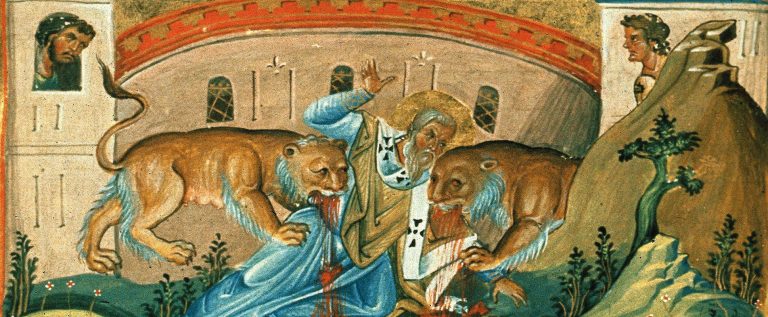By Mike Aquilina [social-share]
Mike Aquilina is the award-winning author of more than fifty books on Catholic history, doctrine, and devotion. He is executive vice-president of the St. Paul Center for Biblical Theology and a contributing editor to Angelus News.

There is today a great deal of curiosity about the earliest years of Christianity. We see it whenever a bestselling novel proposes an alternative story line (or bloodline) for the Church’s origins. We see it whenever an archaeologist turns up a previously unknown apocryphal gospel—and the news media say that it calls everything into question. We see it in the cottage industries that have grown up around the study of the Dead Sea Scrolls and the Gnostic gospels, not to mention the works of the early Church fathers. There are now about half a dozen multi-volume series, in print, of the works of the Fathers.
Why should this concern us as we approach the work of catechesis? Well, for many reasons.
First, it should concern us because it’s of interest to a large and growing segment of the people we’re called to serve—the people we want to reach. Somebody’s buying those books and magazines. Somebody’s tuning into those documentaries on The History Channel. All those somebodies are people hungry for catechesis, even if they don’t know it. Even if they think they’re just curious about history.
Second, the Fathers should concern us because they managed to pull off an amazing achievement. They converted the pagan world in a mere two and a half centuries. They did it without any resources, without any social or political power. They did it with the most primitive communications media. Yet their Church sustained a steady growth rate of forty percent per decade over the course of those centuries. Maybe there’s something we can learn from them.
Finally, the Fathers answer to a deep human need—a need for roots. The fascination with early Christianity is a lot like the widespread, more general interest in genealogy. The early Christians are our ancestors. In fact, the Greek and Latin word for “Fathers” means ancestors, too. Those folks with the uncommon names—Perpetua, Polycarp, Aphrahat—are details of our common genealogy. They’re family to us, in the communion of saints. We have a common mother in the Church; and they do share our bloodline, since they and we have shared holy communion in the blood of Jesus Christ.
Getting to know the Fathers means getting to know our own roots. It means knowing more deeply who we are as we learn more and more about who they are.
When we see them in icons, the early Christians may seem exotic, remote, and essentially different from you and me. But as we allow ourselves to enter their world, by way of study and by way of our imagination, we learn that they’re not so different. We share a common humanity, of course. But, more than that, we share a common Christianity—a Catholic faith that is recognizable across the millennia.
So we see men and women who love the Mass. Who make the Sign of the Cross. Who go to Confession. Who use holy water. Who ask the intercession of the saints, and who offer Mass for the dead. We see a familiar hierarchy of pope, bishop, priest, and deacon. We find devout souls who love to call their Church “catholic.”
Who are the Fathers? They’re a select group of teachers from the early Church. Right away, we should be interested, because they’re teachers like us. We share with them the mission of catechesis.
What’s more, they’re the cream of the crop.
When we speak of “the Fathers,” we’re talking not about everyone who held a teaching office in the Church, or everyone whose writings have survived. Nor are we talking about the smartest theologians, or the nicest or most well-behaved people.
We’re talking about an elite, an exclusive group of around a hundred authors whom Catholic tradition has held up for veneration as somehow “Fatherly” to all Christians of all ages. That’s quite an elite—just a hundred teachers from a span of seven hundred years. When we read the Fathers, we’re reading the best of the best.
Consider what it took for their teaching to survive even the course of their own lifetime. There were no printing presses and no electronic media. So their books and sermons and letters had to be duplicated in longhand. Copying a long book might be a month’s work for a scribe—and the work of a scribe was very expensive. The books were copied onto papyrus or parchment—not the most durable media. There was no such thing as acid-free paper. So the materials tended to rot away quickly. And then the books had to survive not only the elements and the ravages of time—but also the laws of imperial persecutors. It was, at various times, a serious crime to own Christian books. What the authorities found, they destroyed. Sometimes, too, Christians destroyed the evidence or buried it in order to reduce exposure to danger.
So the Fathers are those teachers whose works—whose teaching—has survived a millennium and more, and against all odds. Remember the old hymn: The “faith of our fathers,” even in its written form, is “living still in spite of dungeon, fire, and sword.”













